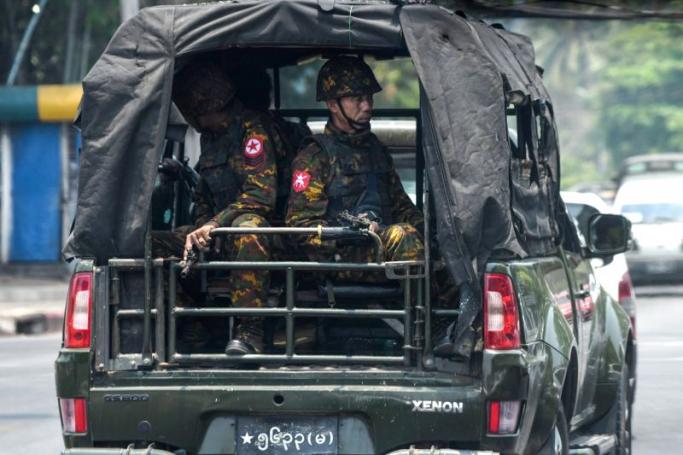AFP
A surprise offensive by Myanmar ethnic armed groups has blocked two strategically vital roads to the country's biggest trading partner China, choking cross-border commerce and denying the cash-strapped junta taxes and foreign exchange.
Fighting has raged across northern Shan state for two weeks, displacing almost 50,000 people, according to the United Nations, and posing the most serious military challenge to the generals since they seized power in 2021.
The blockage to key transport arteries is already leading to higher prices in markets and hampering the junta's ability to send reinforcements to tackle the offensive.
"We haven't seen any (goods) trucks since the fighting started" on October 27, a resident of Muse town on the border with China told AFP.
"There is no trade crossing," they said, requesting anonymity for security reasons, adding that artillery and gunfire were heard regularly from the town.
Hundreds of trucks a day normally pass through, taking fruit and vegetables into China or bringing back electronic equipment, medicine and consumer goods.
In the town of Lashio, about 160 kilometres (100 miles) away by road, residents said they were feeling the impact of the fighting.
"One bag of rice was 160,000 kyat ($76) before fighting," one resident told AFP, also requesting anonymity for security reasons.
"The current price is 190,000 kyat... if there is going to be long fighting, we will have a hard time to survive."
Goods traffic from Muse has all but halted since fighters from the Arakan Army (AA), Myanmar National Democratic Alliance Army (MNDAA) and Ta'ang National Liberation Army (TNLA) launched their offensive on October 27.
Chinshwehaw, another hub on the border with China's Yunnan province, is also currently closed for business.
Last week, the MNDAA posted footage of its fighters raising their flag at the border gate. The junta later admitted it had lost control of the town.
The Chinshwehaw and Muse crossings carried more than a third of the $5.32 billion in border trade with Myanmar's neighbours from April to the start of November this year, according to commerce ministry figures.
Analysts say around a billion dollars of that trade comes from natural gas piped into China through Muse.
More trade likely crosses the border through the black market and is not included in official figures.
Beijing "understood" that infrastructure had not been affected by the clashes, a Chinese foreign ministry spokesman said Friday.
- 'Embarrassing affront' –
The shutdown of the main overland trade routes to China -- a major ally and arms supplier -- is an "embarrassing affront" to the military, said Richard Horsey of the International Crisis Group.
Since the coup, the junta has tried to orient the struggling economy away from Western countries that have slapped sanctions on the generals and their businesses and deepen ties with its giant northern neighbour.
Earlier this month, its central bank chief announced that a cross-border inter-bank payment service had been launched that would "increase bilateral trade and investment" with China, according to state media.
But by then, fighting had already erupted along the border, sending residents near the frontier fleeing into China and strangling local transport.
A longer border closure would "negatively impact Myanmar balance of trade, current account and availability of foreign exchange," Horsey said.
The cash-strapped junta is desperate for foreign exchange to pay for imports, and, rights groups say, the weapons it needs to battle armed resistance to its rule that has taken root across swathes of the country.
- Troops blocked –
Losing control of the border crossings will be "a bit of a hit to revenues, but not a crippling one", Horsey said.
Of more immediate strategic importance is the military's loss of control of the roads along which it sends troops, analysts say.
"Deploying troops into northern Shan has become increasingly difficult, and the military is now relying on helicopters to send reinforcements into the border area," Jason Tower of the United States Institute of Peace told AFP.
The military would find it "difficult" to take back border infrastructure lost in the previous two weeks, he said.
"While it could launch air strikes to take back positions, it would risk infuriating China by destroying critical infrastructure," he said.
AFP












